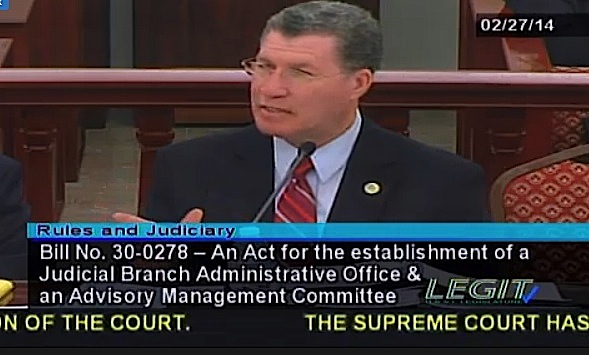
Supreme Court Chief Justice Rhys Hodge and V.I. Bar Association member Adriane Dudley testified that the court and bar strongly favor consolidation, arguing it would save money and make the system more efficient. However, they said, the bill needs further review and amendment before enactment. The committee held the bill for further amendment.
Superior Court Presiding Judge Darryl Donohue and Superior Court Judges Michael Dunston and Harold Willocks testified against the consolidation on the grounds that it ignored local culture and traditions and took a "meat cleaver" to the court structure when a slight adjustment would do.
Sen. Donald Cole, who sponsored the bill, said the Supreme Court contracted the National Center for State Courts to assess the court system and, when it was released, the NCSC draft study recommended consolidation, saying it would save money, streamline services and be more in line with the rest of the country.
The bill "might not be the final piece of legislation that comes out of this body on this subject, but I do believe we need to do it," Cole said. "Based on my research, we are the only jurisdiction under the U.S. flag that does not have a unified court system. … We should not be the last under the U.S. flag," he said.
Hodge urged consolidation, saying every other state and territory has a unified system with core functions like security and procurement under a single entity, which he said "is almost always the chief justice of the Supreme Court." Fifteen states and territories vest authority in the entire Supreme Court and one – the state of Utah – vests that power in a special council formed by the Supreme Court, he said.
The Supreme Court had authority over the Superior Court at its inception, but the Legislature enacted two laws in 2007 [Act 6965 and Act 6985], expressly saying the Superior Court would not be under the jurisdiction of the Supreme Court. These were passed, Hodge said, "literally late at night, without hearings or testimony or discussion."
While the bill may need some amendment, he would be happy if it simply nullified those two laws, Hodge said. If they had never been enacted, the government would have saved more than $10 million over the intervening years, he estimated.
The Superior Court acknowledges the general administrative authority of the Supreme Court, but wants "a meaningful say in its administration," Donohue testified. "The creation of a separate administration does not help us to carry out the day to day administration of the court."
Superior Court Judge Michael Dunston said the bill "imposes a far reaching restructuring of an entire department without regard to its history and traditions," and uses a "meat cleaver" to restructure a department that is "already struggling under budget cuts and staff reductions.
Dunston also said the bill created a conflict, because the Supreme Court could invalidate any later law changing this power. And he said it made sweeping changes "based on a flawed study by the National Center for State Courts that fails to recognize the serious impact of its recommendations upon the Virgin Islands court system and is based upon poorly perceived savings."
Sen. Myron Jackson asked Hodge to address Dunston’s testimony that the study was flawed.
"I am not really clear on what the criticisms are. They just don’t like the result and therefore it is flawed," Hodge said. The report was a comprehensive study that looked at other jurisdictions and came up with specific recommendations, he said. The bill would put in place the same system Congress put in place in Guam, he said.
The National Center for State Courts report is available on the V.I. Supreme Court website at www.visupremecourt.org.
Dunston also said the draft constitution created by the Fifth Constitutional Convention kept the Superior Court separate. Jackson asked about that and Hodge responded the Convention held two committee hearings and recommended the same language used by Guam, "but that got changed on the floor. I don’t know why, whether because of lobbying by friends or what have you," Hodge said.
Cole said the bill would save money, which is crucial. "The budget for 2015 is coming and we have a $40 million deficit right now and we need to save money," he said.
Sen. Sammuel Sanes said he agreed on the need for consolidation but not just for financial reasons.
Before moving to hold the bill for the near future, Cole said, "It is clear more consideration is needed."
Voting to hold the bill were Cole, Jackson, Sanes and Sen. Janette Millin Young. Absent were Sens. Diane Capehart, Shawn-Michael Malone and Kenneth Gittens.
The committee also voted in favor of the nomination of St. Thomas storeowner Prakash Daswani to the St. Thomas Historic Preservation Commission. Daswani has been a retailer on St. Thomas for 30 years and has owned Lucky Jewelers on Dronningens Gade in Charlotte Amalie since 1992.





